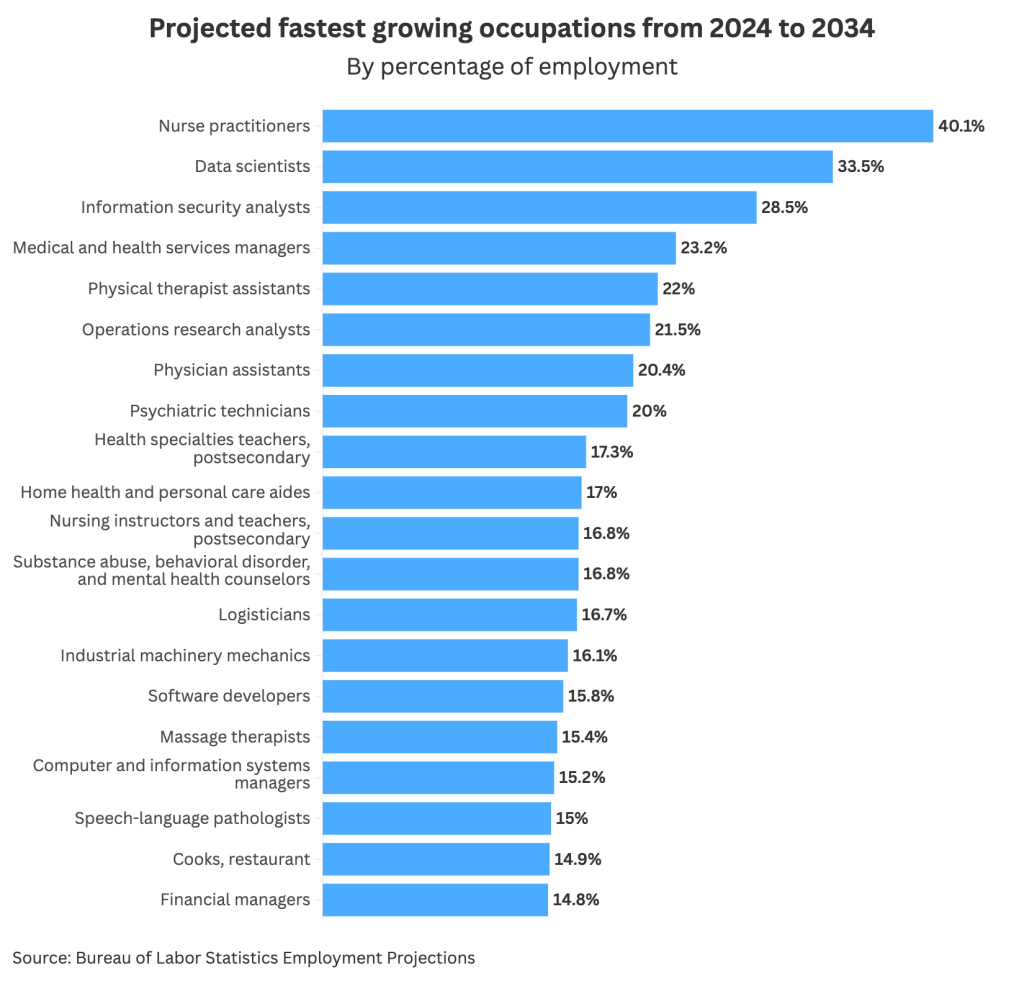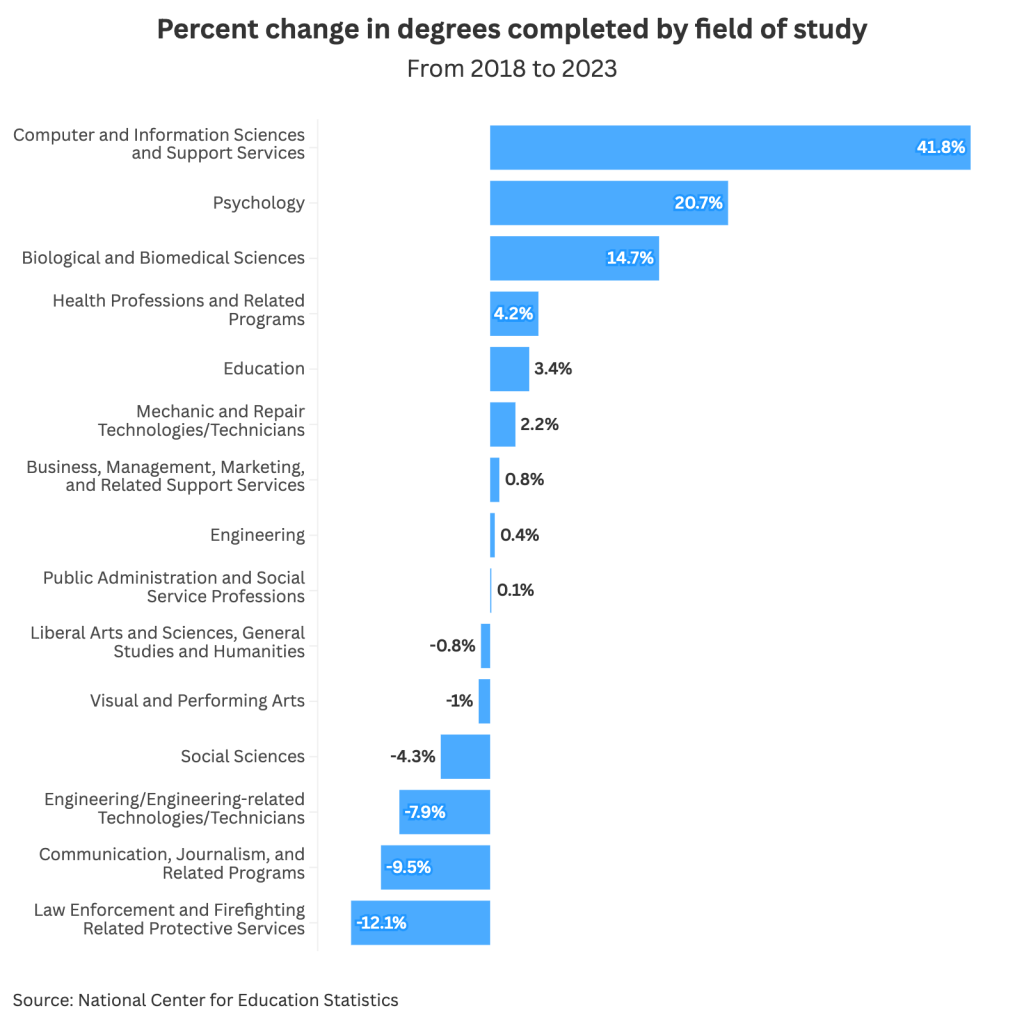
Top majors of 2025 that align education with market demand
Top majors of 2025 that align education with market demand
Choosing a college major is an intricate balancing act between passion and practicality. However, an ever-fluctuating job market influenced by emerging technologies often subtly guides the practicality side of the decision. In 2025, amidst breakthroughs in artificial intelligence, data analytics, health care, and more, the most popular major choices are adapting to a changing world.
Scholarship Institute aggregated data from leading studies conducted by the Bureau of Labor Statistics and National Center on Education Statistics to highlight majors that are rising in popularity and shifting higher education trends.
Why major choice is shifting in 2025
The popular majors are shifting due to several trends. A 2025 study on the key factors currently reshaping the labor market from The World Economic Forum revealed some of these trends. This study identified technological advancement, the green transition, economic uncertainty, geoeconomic fragmentation, and demographic shifts as the leading influences on the labor market in the last few years.
These factors and their influences have had a fascinating trickle down effect on the jobs predicted to be most sought after in the future.

As outlined by the 2024-2034 labor market predictions by the Bureau of Labor Statistics, occupations related to the health care and technology industries are estimated to grow rapidly over the next decade. The robust impact of new technological advancements on these fields is forecasted to spark both new jobs and interest, spurring the estimated growth.
One caveat to consider is the fact that technology is ever-changing innovation not even imagined today could completely alter the job market five years from now. This means forecasts should be used as guidance, not guarantees.
Ranking the fastest-growing majors
With jobs in the health care and technology space expected to grow throughout the next 10 years, this raises the question of which majors are going to grow in popularity as a result. The National Center for Education Statistics put together a 2018-2023 degree completion study that helps answer this exact question:

Degrees in computer and information sciences and support services top the list. With a 41.8% increase in degree completion during the five-year period studied, followed closely by two degree paths in the health care space, this major’s popularity in recent history correlates with forecasted job growth.
This increased competition has also bolstered salary forecasts for jobs related to these majors. Computer science roles, for instance, have an annual starting-to-mid-year range of $80,000-$115,000 based on data gathered by the Federal Reserve Bank of New York. This earning potential only serves to increase interest in associated majors from college students with lofty career goals.
Conversely, majors in social sciences, engineering-adjacent topics, and communications have all experienced declines. These three paths, in particular, were commonly considered to be among the most popular prior to major advances in technology.
Considerations for students choosing a major
Taking all of this into account, it is important to remember that choosing a major is about more than following job market statistics. For example, a 2024 Forbes analysis of a Burning Glass Institute study found that 52% of college graduates at the time were working in jobs that didn’t require higher education.
Essentially, choosing a major that doesn’t align with personal interests may lead a person to find work outside of their field. While this may play to their personal strengths more, limited education in the field negates future growth potential. This is why striking a balance between passion and practicality with a major is important.
To that end, The Princeton Review recommends four tips to assist with declaring the right major based on a potential applicant’s interests:
- Choose a major that offers adequate prep work for the career or field you want to go into
- Consider earning potential for the careers that a major leads to
- Ensure that a large amount of the classwork associated with the major is something you’ll enjoy
- Take the entire first year or two of school to explore classes and your interests prior to declaring
A college major declaration is not a decision that should be rushed. This choice can have a lasting impact on both one’s career path and earning potential, so balancing personal interests with career trajectory when making this decision is crucial.
Deciding the best path for the future
If an individual has no interest in technology or health care, they are not required to go into those fields just because they are projected to be popular. By extension, they don’t need to pick a major related to those paths either.
Applicants should make sure their choice of major reflects their interests, but also take the time to educate themselves on all major options they’re considering, taking into account earning potential, career trajectory, applicability to jobs, and overall outlook. Conducting this analysis will help an individual find the perfect option that blends all their interests.
This story was produced by Scholarship Institute and reviewed and distributed by Stacker.



